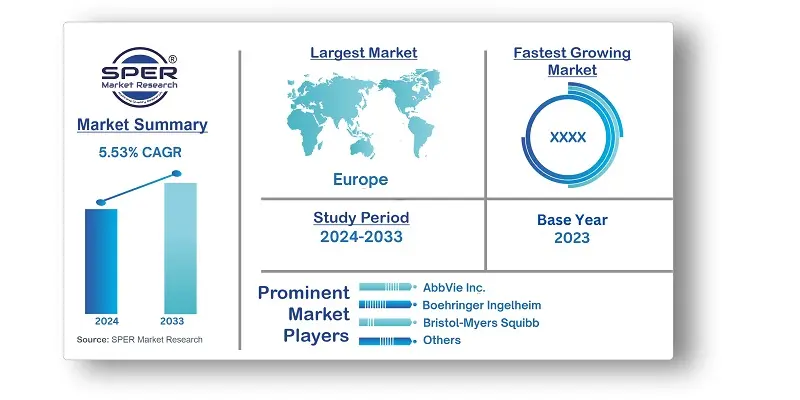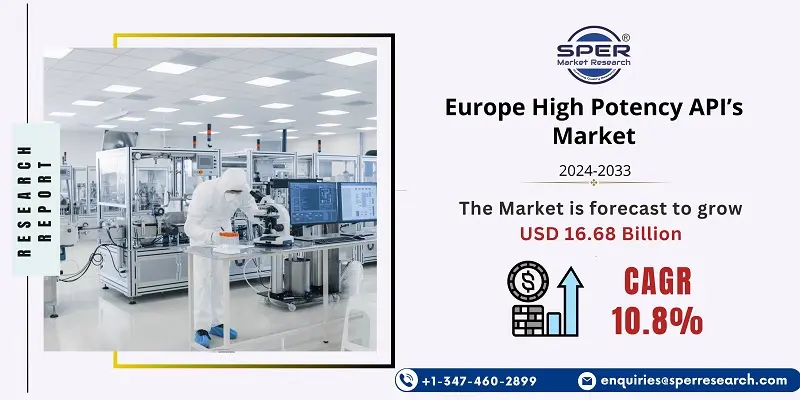
Europe High Potency API Market Growth, Trends, Size, Revenue, Challenges, Future Outlook
Europe High Potency API’s Market Size- By Type, By Synthesis, By Therapeutic Application - Regional Outlook, Competitive Strategies and Segment Forecast to 2033
| Published: Jul-2024 | Report ID: PHAR2410 | Pages: 1 - 154 | Formats*: |
| Category : Pharmaceutical | |||


| Report Metric | Details |
| Market size available for years | 2020-2033 |
| Base year considered | 2023 |
| Forecast period | 2024-2033 |
| Segments covered | By Type, By Synthesis, By Therapeutic Application |
| Regions covered | France, Germany, Italy, Spain, United Kingdom, Rest of Europe |
| Companies Covered | AbbVie Inc., Boehringer Ingelheim, Bristol-Myers Squibb, Eli Lilly and Company, F. Hoffmann-La Roche Ltd., Merck & Co., Inc., Mylan Inc., Novartis International AG, Pfizer, Inc., and Sanofi. |
- Pharmaceutical Companies
- Contract Manufacturing Organizations (CMOs)
- Biotechnology Companies
- Research Institutes and Academic Institutions
- Regulatory Authorities
- Investors and Financial Institutions
- Healthcare Providers and Hospitals
| By Type: |
|
| By Synthesis: |
|
| By Therapeutic Application: |
|
- Europe High Potency API’s Market Size (FY’2024-FY’2033)
- Overview of Europe High Potency API’s Market
- Segmentation of Europe High Potency API’s Market By Type (Innovative high potency API’s, Generic high potency API’s)
- Segmentation of Europe High Potency API’s Market By Synthesis (Biotech high potency API’s, Synthetic high potency API’s)
- Segmentation of Europe High Potency API’s Market By Therapeutic Application (Oncology, Glaucoma, Hormonal Balance)
- Expansion Analysis of Europe High Potency API’s Market
- Problems and Obstacles in Europe High Potency API’s Market
- Competitive Landscape in the Europe High Potency API’s Market
- Impact of COVID-19 and Demonetization on Europe High Potency API’s Market
- Details on Current Investment in Europe High Potency API’s Market
- Competitive Analysis of Europe High Potency API’s Market
- Prominent Players in the Europe High Potency API’s Market
- SWOT Analysis of Europe High Potency API’s Market
- Europe High Potency API’s Market Future Outlook and Projections (FY’2024-FY’2033)
- Recommendations from Analyst
1.1. Scope of the report1.2. Market segment analysis
2.1. Research data source2.1.1. Secondary Data2.1.2. Primary Data2.1.3. SPER’s internal database2.1.4. Premium insight from KOL’s2.2. Market size estimation2.2.1. Top-down and Bottom-up approach2.3. Data triangulation
4.1. Driver, Restraint, Opportunity and Challenges analysis4.1.1. Drivers4.1.2. Restraints4.1.3. Opportunities4.1.4. Challenges4.2. COVID-19 Impacts of the Europe High Potency API’s Market
5.1. SWOT Analysis5.1.1. Strengths5.1.2. Weaknesses5.1.3. Opportunities5.1.4. Threats5.2. PESTEL Analysis5.2.1. Political Landscape5.2.2. Economic Landscape5.2.3. Social Landscape5.2.4. Technological Landscape5.2.5. Environmental Landscape5.2.6. Legal Landscape5.3. PORTER’s Five Forces5.3.1. Bargaining power of suppliers5.3.2. Bargaining power of buyers5.3.3. Threat of Substitute5.3.4. Threat of new entrant5.3.5. Competitive rivalry5.4. Heat Map Analysis
6.1. Europe High Potency API’s Market Manufacturing Base Distribution, Sales Area, Product Type6.2. Mergers & Acquisitions, Partnerships, Product Launch, and Collaboration in Europe High Potency API’s Market
7.1. Europe High Potency API’s Market Size, Share and Forecast, By Type, 2020-20267.2. Europe High Potency API’s Market Size, Share and Forecast, By Type, 2027-20337.3. Innovative high potency API’s7.4. Generic high potency API’s
8.1. Europe High Potency API’s Market Size, Share and Forecast, By Synthesis, 2020-20268.2. Europe High Potency API’s Market Size, Share and Forecast, By Synthesis, 2027-20338.3. Biotech high potency API’s8.4. Synthetic high potency API’s
9.1. Europe High Potency API’s Market Size, Share and Forecast, By Therapeutic Application, 2020-20269.2. Europe High Potency API’s Market Size, Share and Forecast, By Therapeutic Application, 2027-20339.3. Oncology9.4. Glaucoma9.5. Hormonal Balance
10.1. Europe High Potency API’s Market Size and Market Share
11.1. Europe High Potency API’s Market Size and Market Share By Region (2020-2026)11.2. Europe High Potency API’s Market Size and Market Share By Region (2027-2033)11.3. France11.4. Germany11.5. Italy11.6. Spain11.7. United Kingdom11.8. Rest of Europe
12.1. AbbVie Inc.12.1.1. Company details12.1.2. Financial outlook12.1.3. Product summary12.1.4. Recent developments12.2. Boehringer Ingelheim12.2.1. Company details12.2.2. Financial outlook12.2.3. Product summary12.2.4. Recent developments12.3. Bristol-Myers Squibb12.3.1. Company details12.3.2. Financial outlook12.3.3. Product summary12.3.4. Recent developments12.4. Eli Lilly and Company12.4.1. Company details12.4.2. Financial outlook12.4.3. Product summary12.4.4. Recent developments12.5. F. Hoffmann-La Roche Ltd.12.5.1. Company details12.5.2. Financial outlook12.5.3. Product summary12.5.4. Recent developments12.6. Merck & Co., Inc12.6.1. Company details12.6.2. Financial outlook12.6.3. Product summary12.6.4. Recent developments12.7. Mylan Inc.12.7.1. Company details12.7.2. Financial outlook12.7.3. Product summary12.7.4. Recent developments12.8. Novartis International AG12.8.1. Company details12.8.2. Financial outlook12.8.3. Product summary12.8.4. Recent developments12.9. Pfizer, Inc.12.9.1. Company details12.9.2. Financial outlook12.9.3. Product summary12.9.4. Recent developments12.10. Sanofi12.10.1. Company details12.10.2. Financial outlook12.10.3. Product summary12.10.4. Recent developments12.11. Others
SPER Market Research’s methodology uses great emphasis on primary research to ensure that the market intelligence insights are up to date, reliable and accurate. Primary interviews are done with players involved in each phase of a supply chain to analyze the market forecasting. The secondary research method is used to help you fully understand how the future markets and the spending patterns look likes.
The report is based on in-depth qualitative and quantitative analysis of the Product Market. The quantitative analysis involves the application of various projection and sampling techniques. The qualitative analysis involves primary interviews, surveys, and vendor briefings. The data gathered as a result of these processes are validated through experts opinion. Our research methodology entails an ideal mixture of primary and secondary initiatives.



Frequently Asked Questions About This Report
PLACE AN ORDER
Year End Discount
Sample Report
Pre-Purchase Inquiry
NEED CUSTOMIZATION?
Request CustomizationCALL OR EMAIL US
100% Secure Payment






Related Reports
Our Global Clients
Our data-driven insights have influenced the strategy of 200+ reputed companies across the globe.




















